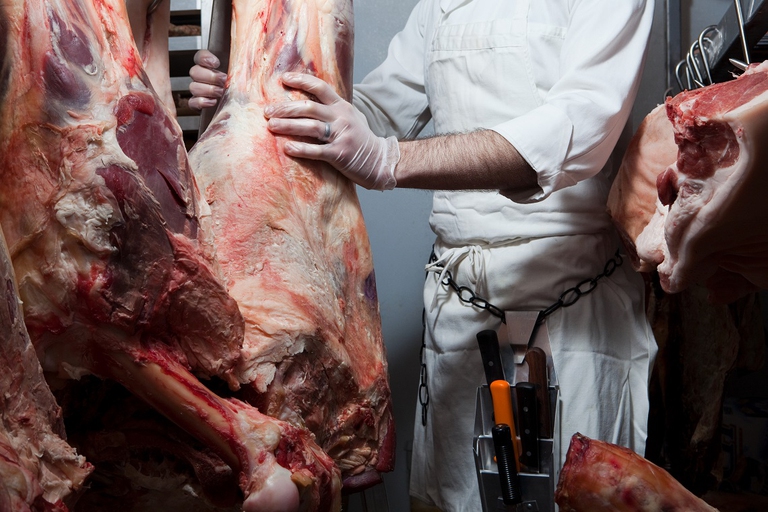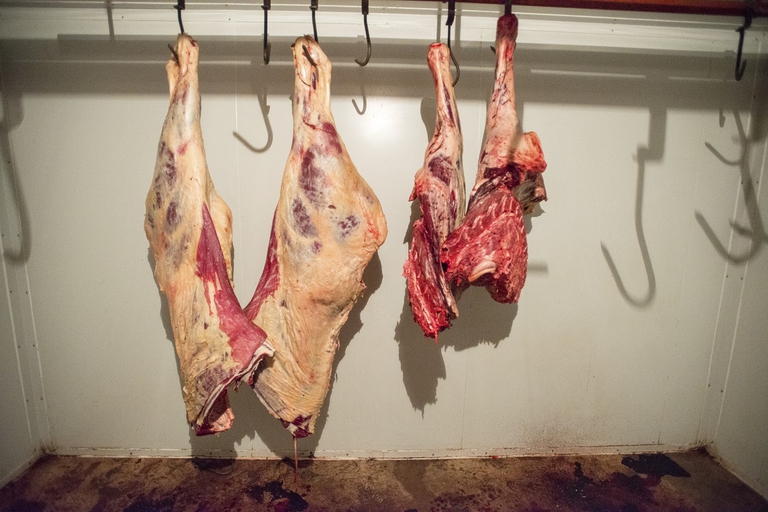
The Canadian province of British Columbia has banned grizzly bear hunting in all its forms. According to the Environment Minister, bears are worth more alive.
Uccidere sistematicamente animali per lavoro è sempre più inaccettabile per i canadesi, i macelli faticano a trovare personale.
Working in a slaughterhouse might mean killing thousands of animals per hour. Moreover, numerous evidences across the world show unspeakable torture on them.
Carrying out a similar job must be upsetting and alienating. In fact, finding people willing to work in slaughterhouses in Canada is hard work. The Canadian Meat Council, Canada’s meat producers association, has reported a shortage of 1,000 slaughterhouse workers, thus confirming this trend.
“Potential employees walk away after a couple of hours,” tells Werner Siegrist, General Manager of the Canadian Premium Meats, leading company in the slaughter sector. In Canada, unemployment rate is on the rise and the economic crisis unveils its effects: GDP has registered a downward trend for 5 months in a row, from January to May 2015.
Despite the lack of jobs, Canadians refuse to systemically kill hundreds of animals and to daily live in contact with death and desperation, in the name of ethical beliefs. This is a clear message to animal farming: a wage may not be enough to assist to certain practices.
Canada’s slaughter industry thus decided to obviate the lack of local manpower by looking for migrant workers. The Canadian Meat Council is in fact trying to ease the hiring of refugees entering Canada to fill vacancies.
However, this goes against the intentions of the federal Employment Minister MaryAnn Mihychuk, who said that “with tens of thousands of layoffs, it makes sense to hire closer to home. In the present circumstance, where we are seeing such economic hard times, it would be a very unusual circumstance where we had to resort to temporary foreign workers to fill a position”.
Sensitiveness towards animals is relentlessly increasing and the awareness of what really happens inside slaughterhouses is discouraging more and more people, at least among Canadian workers.
Siamo anche su WhatsApp. Segui il canale ufficiale LifeGate per restare aggiornata, aggiornato sulle ultime notizie e sulle nostre attività.
![]()
Quest'opera è distribuita con Licenza Creative Commons Attribuzione - Non commerciale - Non opere derivate 4.0 Internazionale.
The Canadian province of British Columbia has banned grizzly bear hunting in all its forms. According to the Environment Minister, bears are worth more alive.
AXA, one of the world’s biggest financial services companies, is dumping investments in tar sands and ending insurance for controversial oil pipelines, taking fossil fuel divestment to new heights.
L’assemblea parlamentare europea ha approvato il trattato Ceta tra Unione europea e Canada. Ora la battaglia si sposta sul piano nazionale.
Per festeggiare il 150esimo anniversario del Paese il ministro dell’Ambiente ha annunciato che i 47 parchi del Canada saranno gratuiti per tutto l’anno.
Justin Trudeau responds to Donald Trump’s executive order to ban travel from seven majority Muslim countries and to put a halt on Syrian refugees coming to the U.S. In addition, the Canadian Immigration Minister Ahmed Hussan, who is a Somalian refugee also responds to the travel ban.
The United States and Canada have announced a permanent ban on oil and gas drilling in parts of the Arctic and the Atlantic.
Canadian Prime Minister Justin Trudeau has approved the building of a major oil pipeline known as the Kinder Morgan pipeline, which will run from the Alberta Tar Sands to the port of Burnaby on the province of British Columbia’s (BC) Pacific coast, whilst rejecting the construction of its twin, the Northern Gateway pipeline. The Kinder
In Canada un gruppo di monaci buddisti ha acquistato numerose aragoste destinate ad essere mangiate nei ristoranti e le ha liberate.
Prime Minister Justin Trudeau announced a new budget in March that pledges over 8 billion Canadian dollars for policies aimed at improving the lives of Aboriginal Canadians. This marks a significant increase in government funding focused on the country’s indigenous peoples, with the intent of reversing centuries of discrimination. Aboriginal Canadians Currently, the aboriginal community in










